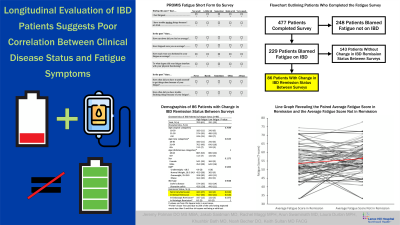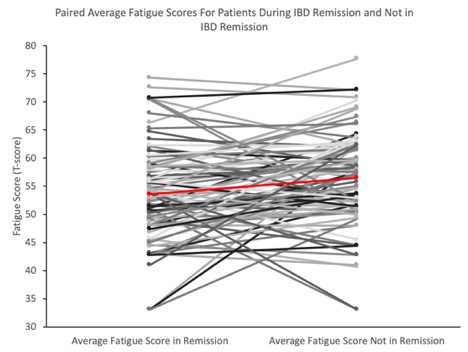Monday Poster Session
Category: IBD
P2600 - Longitudinal Evaluation of IBD Patients Suggests Poor Correlation Between Clinical Disease Status and Fatigue Symptoms
Monday, October 28, 2024
10:30 AM - 4:00 PM ET
Location: Exhibit Hall E

Has Audio

Jeremy Polman, DO, MS, MBA
Lenox Hill Hospital, Northwell Health
New York, NY
Presenting Author(s)
Jeremy Polman, DO, MS, MBA1, Jakob Saidman, MD1, Rachel M. Maggi, MPH1, Arun Swaminath, MD2, Laura Durbin, MPH1, Khushbir Bath, MD3, Noah Becher, DO4, Keith Sultan, MD, FACG5
1Lenox Hill Hospital, Northwell Health, New York, NY; 2Lenox Hill Hospital/Northwell Health, New York, NY; 3Arizona Gastrointestinal Associates, Chandler, AZ; 4Northwell Health, Glendale, NY; 5Northwell Health, Manhasset, NY
Introduction: Significant fatigue occurs in about half of patients with inflammatory bowel disease (IBD) and has been shown to impact quality of life. The etiology of fatigue in IBD patients is unknown, but likely multifactorial. Treatment strategies to improve fatigue can include psychosomatic intervention, increasing physical activity, dietary modifications, and IBD disease control. There is no clear guidance to where primary treatment effort should focus. The purpose of our study was to determine the longitudinal impact of IBD activity on fatigue symptoms.
Methods: IBD patients at an IBD tertiary referral center were asked to complete the validated 8 item PROMIS Fatigue Short Form 8a survey during consecutive office visits between June 2018 and January 2023. Patients were additionally asked if they felt their fatigue was related to their IBD or to non-IBD causes. These scores were then linked to the patient’s IBD clinical remission status, which was determined through physician evaluation at the time of survey completion. Paired T-test analysis was then performed on the patient cohort to evaluate for improvement or worsening of fatigue in relation to IBD remission status.
Results: Of the 477 patients who completed the survey, 229 linked their fatigue to their IBD. Of these 229, 86 who completed the survey had a change in clinical remission status during the period of follow up. At times of clinical remission, the average fatigue score for the patient cohort was 53.6. At times of not in clinical remission, the average fatigue score for the patient cohort was 56.5. This mean difference of -2.88 was found to be statistically significant, with a p-value of 0.004.
Discussion: In our analysis, the 86 patient cohort had statistically significant worsening of fatigue scores while not in remission and had statistically significant improvement of fatigue scores while in remission. While a statistically significant change in fatigue scores was identified, the change was modest and the clinical significance remains unclear. Interestingly, 52% of the patients who completed the fatigue survey linked their fatigue to causes other than IBD. This may suggest the link of fatigue to IBD is overstated in a large cohort of patients and that achieving clinical remission may provide little benefit in fatigue symptoms.

Note: The table for this abstract can be viewed in the ePoster Gallery section of the ACG 2024 ePoster Site or in The American Journal of Gastroenterology's abstract supplement issue, both of which will be available starting October 27, 2024.
Disclosures:
Jeremy Polman, DO, MS, MBA1, Jakob Saidman, MD1, Rachel M. Maggi, MPH1, Arun Swaminath, MD2, Laura Durbin, MPH1, Khushbir Bath, MD3, Noah Becher, DO4, Keith Sultan, MD, FACG5. P2600 - Longitudinal Evaluation of IBD Patients Suggests Poor Correlation Between Clinical Disease Status and Fatigue Symptoms, ACG 2024 Annual Scientific Meeting Abstracts. Philadelphia, PA: American College of Gastroenterology.
1Lenox Hill Hospital, Northwell Health, New York, NY; 2Lenox Hill Hospital/Northwell Health, New York, NY; 3Arizona Gastrointestinal Associates, Chandler, AZ; 4Northwell Health, Glendale, NY; 5Northwell Health, Manhasset, NY
Introduction: Significant fatigue occurs in about half of patients with inflammatory bowel disease (IBD) and has been shown to impact quality of life. The etiology of fatigue in IBD patients is unknown, but likely multifactorial. Treatment strategies to improve fatigue can include psychosomatic intervention, increasing physical activity, dietary modifications, and IBD disease control. There is no clear guidance to where primary treatment effort should focus. The purpose of our study was to determine the longitudinal impact of IBD activity on fatigue symptoms.
Methods: IBD patients at an IBD tertiary referral center were asked to complete the validated 8 item PROMIS Fatigue Short Form 8a survey during consecutive office visits between June 2018 and January 2023. Patients were additionally asked if they felt their fatigue was related to their IBD or to non-IBD causes. These scores were then linked to the patient’s IBD clinical remission status, which was determined through physician evaluation at the time of survey completion. Paired T-test analysis was then performed on the patient cohort to evaluate for improvement or worsening of fatigue in relation to IBD remission status.
Results: Of the 477 patients who completed the survey, 229 linked their fatigue to their IBD. Of these 229, 86 who completed the survey had a change in clinical remission status during the period of follow up. At times of clinical remission, the average fatigue score for the patient cohort was 53.6. At times of not in clinical remission, the average fatigue score for the patient cohort was 56.5. This mean difference of -2.88 was found to be statistically significant, with a p-value of 0.004.
Discussion: In our analysis, the 86 patient cohort had statistically significant worsening of fatigue scores while not in remission and had statistically significant improvement of fatigue scores while in remission. While a statistically significant change in fatigue scores was identified, the change was modest and the clinical significance remains unclear. Interestingly, 52% of the patients who completed the fatigue survey linked their fatigue to causes other than IBD. This may suggest the link of fatigue to IBD is overstated in a large cohort of patients and that achieving clinical remission may provide little benefit in fatigue symptoms.

Figure: Line graph revealing the average fatigue scores of patients in remission vs not in remission superimposed on the individual scores of the 86 patient cohort.
Note: The table for this abstract can be viewed in the ePoster Gallery section of the ACG 2024 ePoster Site or in The American Journal of Gastroenterology's abstract supplement issue, both of which will be available starting October 27, 2024.
Disclosures:
Jeremy Polman indicated no relevant financial relationships.
Jakob Saidman indicated no relevant financial relationships.
Rachel Maggi indicated no relevant financial relationships.
Arun Swaminath: abbvie – Grant/Research Support. janssen – Grant/Research Support.
Laura Durbin indicated no relevant financial relationships.
Khushbir Bath indicated no relevant financial relationships.
Noah Becher indicated no relevant financial relationships.
Keith Sultan indicated no relevant financial relationships.
Jeremy Polman, DO, MS, MBA1, Jakob Saidman, MD1, Rachel M. Maggi, MPH1, Arun Swaminath, MD2, Laura Durbin, MPH1, Khushbir Bath, MD3, Noah Becher, DO4, Keith Sultan, MD, FACG5. P2600 - Longitudinal Evaluation of IBD Patients Suggests Poor Correlation Between Clinical Disease Status and Fatigue Symptoms, ACG 2024 Annual Scientific Meeting Abstracts. Philadelphia, PA: American College of Gastroenterology.
